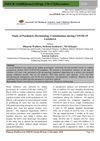 March 2022 in “medRxiv (Cold Spring Harbor Laboratory)”
March 2022 in “medRxiv (Cold Spring Harbor Laboratory)” People with blood group O may have a higher risk of developing post-COVID-19 syndrome.
 November 2021 in “World Family Medicine Journal /Middle East Journal of Family Medicine”
November 2021 in “World Family Medicine Journal /Middle East Journal of Family Medicine” Third booster shots enhance the immune system's response to the COVID-19 virus.
[object Object] September 2021 in “Journal of the American Academy of Dermatology” CTCL patients can safely continue treatment during COVID-19 with proper safety measures.
August 2021 in “Journal of the American Academy of Dermatology” The study evaluated how alopecia areata severity relates to its psychosocial effects on patients.

Maidenhair fern might help with COVID-19 symptoms, but it needs more testing.

Maidenhair fern extract might help treat COVID-19 symptoms, but more research is needed.
 April 2021 in “Rheumatology”
April 2021 in “Rheumatology” An 80-year-old man with COVID-19 also had constrictive pericarditis, possibly due to an autoimmune or immunoglobulin related disease, and improved after surgery.
 December 2020 in “Journal of medical science and clinical research”
December 2020 in “Journal of medical science and clinical research” Most child skin problems during the COVID-19 lockdown were not emergencies and could have been handled by teleconsultation.

Maidenhair fern extract may help treat COVID-19 symptoms.
September 2021 in “Journal of Education, Health and Sport” No clear link between androgenetic alopecia and COVID-19 was found.
202 citations,
January 2022 in “Journal of Clinical Medicine” Women are more likely to have long-term post-COVID symptoms than men.
 36 citations,
July 2020 in “Frontiers in Medicine”
36 citations,
July 2020 in “Frontiers in Medicine” Spironolactone might help protect against severe lung problems in COVID-19 patients.
35 citations,
March 2021 in “BMJ Open Respiratory Research” Older age, being male, and Asian ethnicity led to worse COVID-19 outcomes, with many experiencing long-term symptoms.
27 citations,
January 2020 in “Acta dermatovenerologica Alpina, Pannonica et Adriatica (Tiskana izd.)” Healthcare workers in Turkey experienced more skin problems due to frequent handwashing and wearing masks and gloves during the COVID-19 outbreak.
 21 citations,
February 2021 in “BMJ case reports”
21 citations,
February 2021 in “BMJ case reports” Anabolic steroid users may face higher risk of severe COVID-19.
[object Object]  17 citations,
June 2020 in “British Journal of Dermatology”
17 citations,
June 2020 in “British Journal of Dermatology” Oral mTOR inhibitors often cause skin and hair side effects but usually don't require stopping treatment.
 16 citations,
December 2020 in “International Journal of Clinical Practice”
16 citations,
December 2020 in “International Journal of Clinical Practice” The pandemic changed how often certain skin conditions were diagnosed.
 7 citations,
January 2021 in “The journal of gene medicine”
7 citations,
January 2021 in “The journal of gene medicine” Certain genetic differences may affect how likely someone is to get COVID-19 and how severe it might be.
 5 citations,
July 2021 in “medRxiv (Cold Spring Harbor Laboratory)”
5 citations,
July 2021 in “medRxiv (Cold Spring Harbor Laboratory)” Proxalutamide significantly lowered hospitalization rates in women with mild-to-moderate COVID-19.
 4 citations,
May 2021 in “Journal of The American Academy of Dermatology”
4 citations,
May 2021 in “Journal of The American Academy of Dermatology” There's no significant genetic link between male pattern baldness and COVID-19.
 3 citations,
October 2022 in “Hormone and Metabolic Research”
3 citations,
October 2022 in “Hormone and Metabolic Research” Male hormones may increase the severity and death rates of COVID-19.
 3 citations,
January 2022 in “Einstein (São Paulo)”
3 citations,
January 2022 in “Einstein (São Paulo)” The pandemic increased stress-related skin conditions and those affected by behavior changes.
 3 citations,
March 2021 in “Journal of the European Academy of Dermatology and Venereology”
3 citations,
March 2021 in “Journal of the European Academy of Dermatology and Venereology” The letter is skeptical about the effectiveness of anti-androgen therapy for COVID-19 and calls for strong evidence from clinical trials.
 2 citations,
December 2021 in “F1000Research”
2 citations,
December 2021 in “F1000Research” Most people in South India lack knowledge about managing COVID-19 at home.
 1 citations,
November 2022 in “F1000Research”
1 citations,
November 2022 in “F1000Research” The skin conditions of Iraqi women changed during the COVID-19 pandemic, with more hair loss and skin irritation but fewer contagious skin infections.
1 citations,
March 2022 in “Irish Journal of Medical Science” Men with androgenetic alopecia and hypertension may experience more severe COVID-19.

Stem cell therapies, especially adipose-derived ones, show promise for treating severe COVID-19 and related conditions.
December 2023 in “International journal of research publications” Herbal medicine and nutraceuticals may help treat Post COVID-19 Syndrome, but more research is needed.
 November 2022 in “Journal of the Endocrine Society”
November 2022 in “Journal of the Endocrine Society” A woman with ectopic Cushing's syndrome and COVID-19 passed away despite treatment.





















